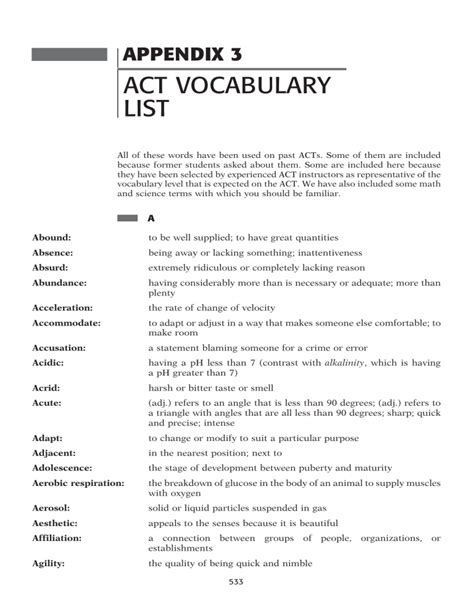The ACT is a standardized test that measures students’ college readiness in English, math, reading, and science. The English section of the ACT assesses students’ proficiency in grammar, usage, and vocabulary. A strong vocabulary is essential for success on the ACT English section, as well as for college coursework and beyond.

This vocabulary list provides definitions of 100 words that frequently appear on the ACT. By studying these words, you can expand your vocabulary, improve your ACT score, and enhance your overall communication skills.
Table 1: ACT Vocabulary List – Part 1
| Word | Definition |
|---|---|
| Abrogate | To abolish or annul |
| Abstruse | Difficult to understand |
| Accede | To agree or consent |
| Acolyte | A follower or assistant |
| Adjudicate | To settle or decide a dispute |
| Admonish | To scold or reprimand |
| Adumbrate | To foreshadow or indicate dimly |
| Aegis | Protection or sponsorship |
| Anachronism | Something out of its proper time |
| Antipathy | A strong dislike or aversion |
Table 2: ACT Vocabulary List – Part 2
| Word | Definition |
|---|---|
| Apocryphal | Of doubtful authenticity |
| Appease | To calm or pacify |
| Appurtenance | Something attached or belonging to something else |
| Arduous | Difficult or laborious |
| Ascetic | Practicing self-denial and austerity |
| Assuage | To lessen or relieve (pain, hunger, etc.) |
| Attenuate | To make thinner or weaker |
| Augur | To predict or foreshadow |
| Auspicious | Favorable or promising |
| Autonomous | Independent or self-governing |
Table 3: ACT Vocabulary List – Part 3
| Word | Definition |
|---|---|
| Beneficent | Kind or charitable |
| Bequeath | To leave something to someone in a will |
| Boorish | Ill-mannered or rude |
| Brobdingnagian | Of giant size |
| Calumny | A false or malicious statement |
| Capricious | Fickle or unpredictable |
| Castigate | To criticize or punish severely |
| Caustic | Corrosive or biting |
| Censure | To express strong disapproval of |
| Circumlocution | A roundabout way of speaking |
Table 4: ACT Vocabulary List – Part 4
| Word | Definition |
|---|---|
| Coalesce | To come together or unite |
| Cogent | Forceful or persuasive |
| Compunction | A feeling of guilt or remorse |
| Conciliatory | Intended to restore harmony |
| Concomitant | Happening at the same time |
| Condescend | To treat someone with superiority |
| Confidant | A person trusted with secrets |
| Conjure | To call up or summon |
| Contagion | A disease that spreads by contact |
| Contentious | Causing or likely to cause controversy |
Additional Tips for ACT Vocabulary Preparation
- Use a dictionary: Look up unfamiliar words in a dictionary to learn their meanings, pronunciations, and usage.
- Read widely: The more you read, the more new words you will encounter and learn.
- Practice using new words: Use new words in your writing and speaking to improve your familiarity with them.
- Take practice ACTs: Practice ACTs will help you identify words that you need to study further.
- Use flashcards: Create flashcards with new words and their definitions to help you memorize them.
By following these tips, you can expand your vocabulary, improve your ACT English score, and enhance your overall communication skills.
FAQs
-
How many words should I know for the ACT English section?
According to the ACT website, students should have a working vocabulary of at least 10,000 words for the English section. -
How can I learn new ACT vocabulary words effectively?
Use the tips listed above, such as using a dictionary, reading widely, and practicing using new words. -
What are some good sources for ACT vocabulary lists?
There are many resources available online and in libraries that provide lists of ACT vocabulary words. -
How important is vocabulary for the ACT English section?
Vocabulary is essential for the ACT English section. Students who have a strong vocabulary will be able to better understand the passages and answer the questions correctly. -
Are there any shortcuts to learning ACT vocabulary?
There are no shortcuts to learning ACT vocabulary. However, using the tips listed above can help you learn new words more effectively. -
How can I practice using new ACT vocabulary words?
Use new words in your writing and speaking. You can also create flashcards with new words and their definitions to help you memorize them. -
How much time should I spend studying ACT vocabulary?
The amount of time you need to spend studying ACT vocabulary will vary depending on your individual needs. However, it is important to spend time regularly studying new words. -
Is it better to study ACT vocabulary alone or with a group?
Both studying alone and with a group can be effective. If you study alone, you can focus on your own pace and learning style. If you study with a group, you can benefit from the support and encouragement of others.
